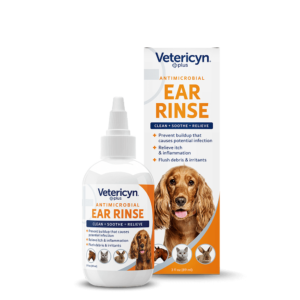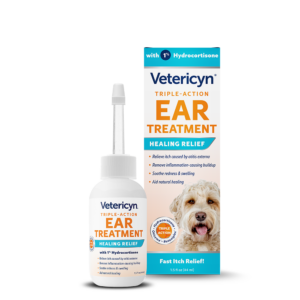Updated June 15, 2025
Itching, gunk, smells—infected ears can really rain on your pup’s parade! Ear infections in dogs are a common health issue for canines of all stripes.
Dogs have unique L-shaped ear canals that trap moisture and dead cells, causing an inviting atmosphere for pesky bacteria and yeast. These infections can cause pain and severe discomfort for your pup.1
Many ear infections won’t heal on their own and require veterinary attention. Fortunately, if symptoms are minor, you can manage and treat the dog’s ears at home, potentially avoiding a trip to the veterinarian. However, severe cases and chronic infections may need professional veterinary care. Read on to learn how to treat dog ear infection without vet visits (and signs that it might be time to consult the pros).
What are the Symptoms of a Dog Ear Infection?
If your pup starts displaying unusual symptoms—if your dog’s ear smells, for instance—you’ll want to know whether ears or another issue are to blame.
Canine ear infections have a few tell-tail signs. Look out for2:
- Pus or dark-colored discharge from the ears
- Crusty scabs around the ears
- Whimpering (and other signs of pain)
- Loss of balance (in severe cases)
Because of the close bond between the ears and jaw, a sudden loss of interest in food can also be a signal that something is amiss in your pup’s ears—especially when combined with other common symptoms.
Types of Infection
Each type of dog ear infection requires a different management approach. Not all dog ear infections are created equal. Some affect only the outer ear and skin layers, while others involve internal structures.
Understanding how to treat troubled ears starts with zeroing in on the infection type. There are three main varieties3:
- Otitis externa – By far the most common ear malady, otitis externa impacts the outer ear. It’s usually triggered by allergies, ear mites, lingering moisture, or wax buildup.
- Otitis media – Otitis media occurs when the middle ear (the space behind the eardrum) becomes infected (often due to untreated otitis externa).
- Otitis interna – Quite rare, but also serious, otitis interna occurs when bacteria infiltrate the inner ear. This ear problem can result in balance issues and hearing loss if unaddressed.
Middle ear and inner ear infections require a vet’s expertise, but it’s possible to heal otitis externa at home.
Since deeper ear infections are often caused by uncontrolled outer ear issues, promptly handling otitis externa is an excellent way to prevent more severe infections.
Home Treatments for Irritated Ears
It’s crucial to apply the right remedy for dog ear infections. If you’re dealing with a case of otitis externa, remedies for dog ear infections can provide relief. All dogs are different, so try out a few methods and see which works best for symptom relief. Manage the issue with patience and care for the best results.
A few classic remedies include:
-
- Green tea – Long renowned for its anti-inflammatory properties, Green tea can help reduce minor swelling, irritation, and pain brought on by ear infections in dogs.4 Steep a bag in boiling water and let it cool to room temperature. Gently swab it onto your dog’s ear.
- Oil of oregano – Oil-based remedies can effectively manage inflammation, and studies have shown that oil of oregano packs a powerful anti-bacterial punch.5 It’s quite potent, however, so take it slow. Add a single drop to a small amount of water, dip a fresh cotton ball into the mixture, and gently swab the problem area.
- Apple cider vinegar – A 50/50 mixture of apple cider vinegar and distilled water can help keep dog ears clean and soothe irritation. Apple cider vinegar also possesses antibiotic and antifungal properties—exactly the traits you want in your corner.6
These home treatments won’t directly eliminate the dog’s ear infection, but they can ease some symptoms and pave the way for healing. Understanding what causes ear infections is vital to preventing future occurrences.
A strong underlying health regimen is also a reliable defense against ear infections and will help prevent future issues. Feed your pup a nourishing diet, give them plenty of exercise, and consider adding nutrient-packed dog supplements like Vetericyn ALL-IN (formulated to foster robust overall health). Remember to consult your veterinarian before starting any home remedies.
Enter the Cone Zone
Let’s face it: no pup enjoys donning the “cone of shame.” But in the case of persistent ear troubles, it can be a huge help.
Otitis externa in dogs can cause severe irritation and itching. The urge to scratch will be irresistible for your furry pal, but pawing at the affected ear will only worsen the problem.
A well-fitting protective cone will safeguard your dog’s ears as they heal. While it’s no fun watching your pal do time in the cone, keep in mind that it’s sparing them from further discomfort down the road.
If the cone is too much, explore lighter options like inflatable collars or cones made from soft fabric (as opposed to plastic).
Using OTC Options
In addition to home remedies, over-the-counter treatments, and dog ear infection medicine can help your pup heal up. Top options include:
- Diphenhydramine – If allergies are the root of the issue, antihistamines like diphenhydramine (the active ingredient in Benadryl) could help reduce inflammation, itching, and irritation.
- Hydrocortisone – A veteran in the anti-inflammation game, hydrocortisone for dogs fights itching, swelling, and redness.8
While these treatments can help, they aren’t specifically formulated for canine ear infections.
For best results, turn to a tailor-made formula like Vetercyn’s Triple-Action Ear Treatment which features an itch-fighting trifecta of:
- Hydrocortisone 1% – A pro-level anti-itch and inflammation compound
- Otizyme – A powerful enzyme solution that helps dissolve wax and flush out debris
- Botaniplex – Supports immune response and restores microbiome and sebum balance
When you’re looking for swift, powerful relief from otitis externa and other dog ear maladies, Triple-Action Ear Treatment can support overall recovery. Applying these treatments can help promote healing and clear away residual buildup. It also comes with a flex-spout applicator for mess-free use. Although these treatments are effective, consulting a veterinarian ensures you address underlying causes properly.

Preventing Dog Ear Infections
Proper dog ear care builds a foundation for long-term ear health. Any paw parent can master treating and preventing dog ear infections without a veterinarian visit. Prevention is all about proper ear care.
There are two main ways to prevent dog ear infections: keeping them dry and clean.
#1 Keep ‘Em Dry
Moisture is a major source of ear woes for dogs. Because your pup’s ear canal takes a hard right turn, it’s easy for even small amounts of fluid to become trapped in the tunnel.
Breeds with floppy ears, like beagles, are more prone to infections because their ears fall like tent flaps over the canal. This creates a damp, dark environment which promotes the growth of bacteria and yeast.
To prevent moisture buildup, get in the habit of:
- Drying your dog’s ears thoroughly after swimming or bathing
- Placing cotton balls in your dog’s ears before bathing (not too deep, of course)
Dry ears are healthy ears. Remaining vigilant about moisture buildup will ward off many ear troubles.
#2 Keep ‘Em Clean
Consistent cleaning helps prevent discomfort and irritation. Beyond moisture, there are a few other common culprits when it comes to ear ailments. These include:
- Ear mites
- Allergic reactions
- Foreign material (dirt, fungi, and yeast, for instance)
- Wax buildup
Keeping ears squeaky clean is your first line of defense. Aim for a thorough dog ear cleaning once a month9 (more often if your pup has floppy ears or a history of ear troubles). Keeping ear hair trimmed also helps manage and prevent wax buildup.
Not sure how to clean dog ears? Luckily, you don’t need a mighty arsenal of supplies to perform a home ear cleaning. Before you sit down to work, gather:
- Cotton balls or gauze
- An ear cleanser (such as Vetericyn Plus Antimicrobial Ear Rinse)
- Fresh, dry towels (one for your pet to lie on, the other to dry their ears)
Once you’ve got your tools assembled and your pup is as calm and ready for their spa day (shameless bribing with treats is acceptable here), follow these steps10:
- Follow the instructions on your cleaning solution bottle.
- Massage around the base of the ear for roughly 30 seconds.
- Allow your dog to shake the solution out of their ears (be sure to take cover).
- Use the cotton balls to sponge away any lingering debris in the ear canal.
- Dry off your furry pals’s fur, ears, and face (and offer a final treat as a reward).
When applying the pet ear cleanser, be careful not to let the bottle’s nozzle touch the ear canal—this contact can introduce bacteria.

When’s It Time for a Vet Visit?
With diligent cleaning and a watchful eye for warning signs, paw parents can manage many ear issues at home. Minor ear infections can worsen quickly, however, and home remedies won’t always be enough to combat their effects.
If you spot any of the following red flags, it’s time to pay the vet a visit:
- Symptoms don’t improve within a few days of starting home treatment
- Chronic ear infection symptoms appear (beyond minor itching and redness)
- Your pup is in obvious pain and won’t allow you to treat them
Don’t worry: your vet will be able to handle most ear struggles with no trouble. This is why pup parents build a relationship with a trusted vet in the first place—to consult a pro when you’re not sure where to turn. Even the most diligent paw parents can’t manage every canine ear infection. If home remedies fail, seek veterinary advice to manage severe infections properly.
When in doubt, ring the vet.
Vetericyn: Music to Your Pup’s Ears
At Vetericyn, we have one goal: to help pets live their best lives. When you call your pup’s name at chow time, they deserve to hear it through clean, healthy ears. We crafted our Triple-Action Ear Treatment and Antimicrobial Ear Rinse to help pet parents promote overall ear health and keep pups itch-free.
And Vetericyn goes beyond ear care. We work relentlessly to produce top-notch, vet-endorsed animal wellness products to brighten the lives of furry friends everywhere. From the soothing relief of our Antimicrobial Hot Spot Gel to the coat-friendly caress of our Foamcare Medicated Pet Shampoo, we have what you need to keep pets happy and healthy.
Discover the Vetericyn difference—explore our dog care products today!
 Reviewed by Dr. Kathy Adamson
Reviewed by Dr. Kathy Adamson
Dr. Kathy Adamson earned her bachelor’s degree from the University of Notre Dame and her Doctor of Veterinary Medicine degree from the University of Wisconsin-Madison School of Veterinary Medicine.
She completed a one-year small animal medicine and surgery internship at the North Carolina State College of Veterinary Medicine. Alongside her studies, Kathy worked in a research lab, contributing as an author and co-author to various journal articles.
She has also pursued medical writing and editing certification through the University of Chicago Graham School. Currently, she runs KMA Veterinary & Medical Writing, a freelance medical writing company, serves as the Digital Content Manager for the Greater Chicago Area Chapter of the American Medical Writers Association, is a member of the AMWA Communications Committee, and enjoys writing about healthcare topics for people and their cherished pets.
![]() https://www.linkedin.com/in/kathyadamsondvm/
https://www.linkedin.com/in/kathyadamsondvm/
Sources:
-
- Washington State University College of Veterinary medicine. Examining and Medicating the Ears of a Dog. https://hospital.vetmed.wsu.edu/2022/01/04/examining-and-medicating-the-ears-of-a-dog/
- American Kennel Club. Dog Ear Infections: Symptoms, Causes, Treatment, and Prevention. https://www.akc.org/expert-advice/health/dog-ear-infections/.
- Forbes. Ear Infections in Dogs: Complete Guide. https://www.forbes.com/advisor/pet-insurance/pet-care/dog-ear-infection/.
- National Library of Medicine. Anti-inflammatory Action of Green Tea. https://pubmed.ncbi.nlm.nih.gov/27634207/
- WebMD. Oregano Oil: Is it Good for You? https://www.webmd.com/diet/oregano-oil-good-for-you.
- Natchez Trace Veterinary Services. Apple Cider Vinegar: Home Remedy For Dog Ear Infection. https://franklintnvet.com/apple-cider-vinegar-home-remedy-for-dog-ear-infection/
- American Kennel Club. Benadryl For Dogs: Uses, Side Effects, and Dosage Information. https://www.akc.org/expert-advice/health/benadryl-for-dogs/
- WebMD. Hydrocortisone Cream – Uses, Side Effects, and More. https://www.webmd.com/drugs/2/drug-10402-859/hydrocortisone-topical/hydrocortisone-topical/details
- CityVet. How to Care For Your Dog’s Ears. https://www.cityvet.com/how-to-care-for-your-dogs-ears/
- American Kennel Club. How to Clean a Dog’s Ears. https://www.akc.org/expert-advice/health/how-to-clean-dogs-ears/

